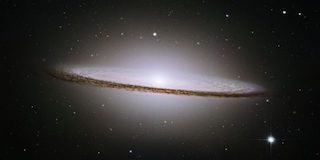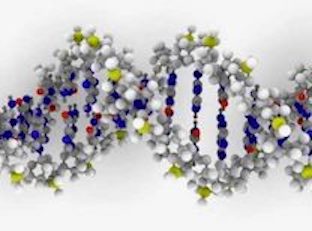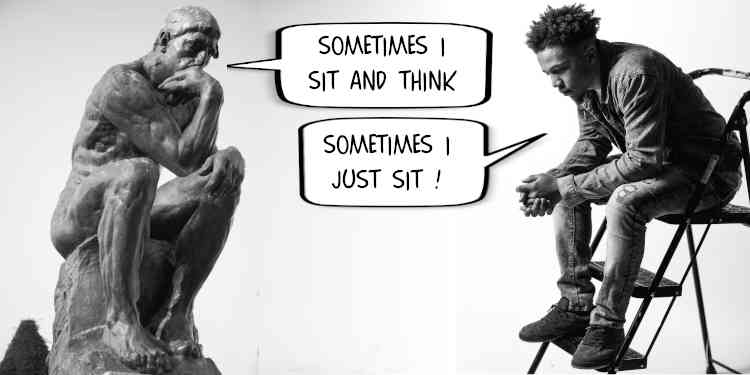Most people’s belief or disbelief in God is based on fairly personal factors (I think). For many christians, belief is based on Jesus as he is portrayed in the gospels.
But some people (including me) also look to philosophy and science to provide information and arguments.
Here is a summary of some of the arguments.
Explaining our universe
Cosmological argument

The Sombrero Galaxy, about 30 million light years away. It is about a third of the size of our “Milky Way” Galaxy, and is quite different in composition. There is a massive black hole at its centre.
It is believed there may be at least 2 trillion galaxies in the universe. It is hard to believe that all this matter, space and energy appeared out of nothing.
The known laws of physics show that it is highly improbable that a naturally occurring universe would allow stars and galaxies to form.
For millennia (probably longer) people have wondered why the world or the universe exists at all. This argument concludes that the universe must have been created, because it couldn’t have appeared out of nothing – if nothing existed then nothing would ever exist..
It seems logical that there must be something that has always existed (and so never appeared out of nothing), and everything else came from this. The material universe itself doesn’t look like it has always existed (if it had, every physical action would have long since ceased and the universe would have “run down” to a thin homogeneous “soup”, where nothing more could happen).
So, the argument goes, a non-material God who has always existed is the best explanation.
Fine-tuning argument
About 50 years ago cosmologists were examining some of the fundamental properties of the universe (like the size of forces like gravity, the mass and charges of particles like electrons, etc) and found that the universe is “fine-tuned”. If any of these values was very different, the universe probably wouldn’t exist at all, and certainly wouldn’t have allowed life to evolve.
Computer modelling has shown that of all the possible universes allowed by physics, only a vanishingly small number would allow life. The odds of this happening by chance are so small that an explanation must be found. Creation by God is one such explanation.
The only scientific explanation is that there may actually be many, many different universes, and ours is one of the very few that allows life. But critics of this idea point out the science is speculative, and we still have to explain how a multitude of universe, each with different physical values, came to exist. So God might still be the best explanation.

Moral argument
Most people believe we all have a moral sense, and there are some things that are truly right or wrong. For example, most people would believe the Holocaust, war crimes, pedophilia, genocide and rape are wrong.
But if humans are merely intelligent animals produced by evolution, how can things can be truly right or wrong, rather than helpful to survival and reproduction? All the evils I have just mentioned could help survival.
So it seems that we have to either cease thinking these things are wrong, or find an explanation “behind” our evolution that explains our moral sense.
A moral God is the obvious explanation. He knows these things are truly wrong because they contravene “the law of love”. Our moral sense is impaired, so we don’t always see this.
Euthypro’s dilemma
Does God command things because they are right (in which case he is subject to a moral law higher than him), or are they right because he commands them (in which case morality is arbitrary)?
This is supposed to be a dilemma for theists, but I think it isn’t demeaning for God to be subject to moral law, just as he is subject to logic and maths.
Human capabilities
Humans are capable of amazing things.
Consciousness

We are conscious of ourselves as beings who experience emotions like pleasure and pain. I experience things from my perspective, and I don’t know your experience. Scientists cannot explain why we are conscious in this way, it seems to provide no evolutionary advantage. But if God created us to be spiritual beings, that would explain consciousness.
Free will
If there is no God and the world is purely physical, then everything that occurs is a physical process governed by physical and chemical laws. This includes the processes in
our brains.
So, given a certain sensory input, the brain responds according to physical laws and I react in some way – but there wasn’t any way for me to react differently because there is nothing outside the laws to change my thoughts. Many scientists conclude – free will is an illusion (see box).
The only way I can have true freedom to make a different choice is if the physical laws are NOT all that controls my brain – that there is a non-physical element to life. The existence of a creator God provides this possibility.
Quotes on free will
“Naturalistic evolution has clear consequences …. human free will is nonexistent.”
Prof William Provine
“The impossibility of free will …. can be proved with complete certainty.”
Philosopher Galen Strawson
“The sense of will is an invention of the brain.”
Physiologist Colin Blakemore
“In order to engage in rational decision making we have to presuppose free will”
John Searle:
[free will is a] “morally necessary illusion”
Philosopher Saul Smilanski
Rational thought
Furthermore, if my brain processes are controlled by physical laws, then they can’t be controlled by logic unless somehow my brain has evolved to be logical. We can see how this might be possible for very simple thoughts – it would be evolutionarily advantageous for us to have some basic cognitive faculties.
But it doesn’t seem to confer a survival advantage to be able to engage in deep abstract analytical thought, in fact it may slow down our response when we need to react quickly. So again, it seems our brains must be more than physical in some way.
All three of these considerations suggest that humans are not merely the result of physical evolution, but that a creator God used evolution to create us as more than physical beings.
Religious experience

People all over the world claim to have experienced God in some way – he spoke to them, or appeared in a vision, healed them, helped them, answered their prayers, etc. It is easy to dismiss these experiences, but they are very common and some of them are supported by good evidence.
Sometimes people who are prayed for are remarkably healed – sometimes the results are even written up in medical journals. Other times God’s intervention leads to very positive changes in people’s lives.
Studies show that people who have these experiences are not suffering from a mental illness – in fact overall they are apparently healthier than average.
So we may reasonably ask whether ALL these reports can be dismissed? Perhaps God has really interacted with them. Of course we may then ask whether the christian God would be healing Muslims or Hindus? Nevertheless, these reports provide significant evidence of God.

Other arguments
Many people think other aspects of life point to God:
- The laws of mathematics seem to be universal, yet this doesn’t seem to be necessary in a physical universe.
- The sophisticated information contained in DNA suggests a designer.
- Are beauty and love likely results of physical evolution?
On the other hand ….
There are, of course arguments against the existence of God, including the apparent hiddenness of God and the claim that everything we know can be explained without God.
Just one argument seems to me to be strong – the argument that a good God wouldn’t have created a world where so much suffering and evil can occur. While we can explain why some evil occurs – because God has given us the great gift of free will – it is hard not to wonder why it needed to be this bad.
I agree the argument is strong, and makes it harder to believe in God. But there are so many arguments that indicate that God does indeed exist, I am more influenced by them. But human suffering remains somewhat of a mystery to me.
Putting it all together
These theistic arguments have cumulative force to me. Philosophy suggests that God most likely exists. And that he is a creator who had a plan to create humans with the ability to think, love, act ethically and freely, and to use these abilities to discover him and to live fulfilled and moral lives.
This reinforces what I learn from Jesus, and gives me greater confidence that I can put my faith in him.
References
The science of fine-tuning: If you want to read more about the science of fine-tuning, A Fortunate Universe by Aussies Geraint Lewis and Luke Barnes is the book you want.
Main graphic: Charl Durand and Eric W, with additions by unkleE. Additional graphics from Pexels and NASA.




